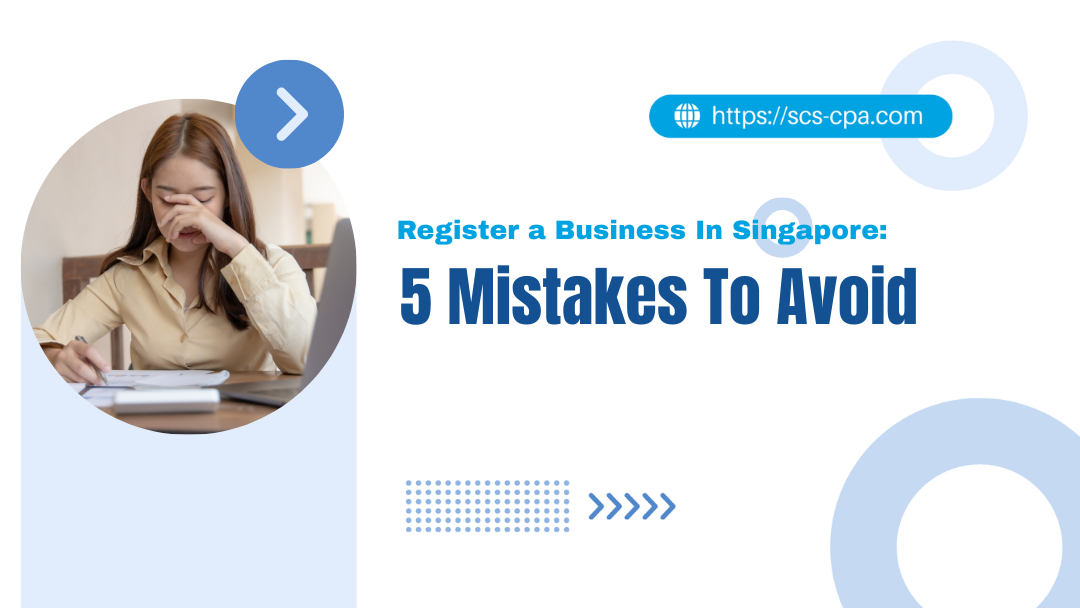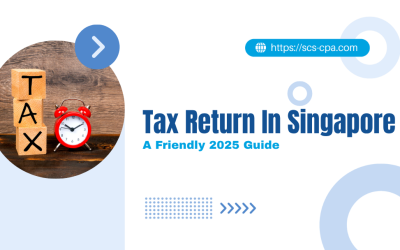
When you register a business in Singapore, you gain legal recognition and access to bank services. It also builds credibility with clients and suppliers. Plus, it can help you get government grants or contracts. However, many entrepreneurs make avoidable mistakes. These mistakes can result in lost time, financial losses, or even lead to legal issues and consequences.
In this article, we will explore five key mistakes people make when registering a business in Singapore. This way, you can avoid these problems from the beginning.
Mistake 1: Choosing the Wrong Business Structure
(Pre‑Registration)

What the Mistake Is
Selecting a business structure that doesn’t align with your needs. For example, using a sole proprietorship when what you really need is the limited liability and credibility of a Private Limited Company (Pte Ltd).
When It Happens
During the planning phase, before you register a business with ACRA.
Consequences
- Personal assets may be at risk if the business is sued or incurs liabilities.
- Tax obligations can be heavier, since corporate tax advantages and exemptions are not available under simpler structures.
- Difficulty raising capital, securing contracts, or getting business banking services if you are not a Pte Ltd.
- Reorganising later (e.g. converting to Pte Ltd) involves extra cost, additional compliance, and potential loss of continuity.
What the Law Says & Risks
ACRA laws permit various structures with differing liability and compliance obligations. Selecting the wrong structure can lead to lost opportunity and sometimes issues with permit/licensing applications that assume certain entity types.
Solution
- Use official resources (ACRA’s business structure guides) or engage a Corporate Service Provider (CSP) to compare structure types.
- Consider liability, tax, growth potential, cost, and compliance obligations before choosing a business structure.
- Keep plans in mind. If you plan to raise funding, hire staff, or expand, a Pte Ltd is often a better long-term option.
Mistake 2: Submitting Incomplete or Incorrect Documentation

What the Mistake Is
This mistake indicates that your registration has errors. Among the mistakes are: wrong local address, incorrect director or owner information, missing documents (constitution, consent letters), or misfilled forms.
When It Happens
At the stage of submitting incorporation documents with ACRA.
Consequences
- Your application may be rejected or delayed, sometimes significantly.
- Legal risk: making false statements can expose you to penalties, including fines or even prosecution under certain acts.
- Delay in operations, inability to open bank accounts, or begin contractual work if registration is delayed.
Penalties & Legal References
- Under ACRA, submitting false or misleading information can result in fines up to SGD 50,000. Or, imprisonment of up to 2 years in serious cases.
- Failing to notify ACRA about director/address changes or mis‑statements may incur fines up to SGD 5,000.
Solution
- Create a complete checklist of required identity, address, consent, and document forms.
- Use official templates where possible.
- Have another person review all entries for accuracy before submission.
Mistake 3: Picking a Bad Business Name or an Invalid
Registered Address

What the Mistake Is
Choosing a name that’s too similar to someone else’s, using prohibited or sensitive words, or using a P.O. Box as your business address is not allowed.
When It Happens
During name reservation and early in the application process with BizFile+.
Consequences
- Name reservation may be rejected, forcing you to resubmit and lose time.
- Banks or licensing authorities may reject applications because of name conflicts or unprofessional presentation.
- Public trust can suffer if the name or address appears dubious or confusing.
Solution
- Use ACRA’s name‑search tool to check availability/similarity.
- Prepare backup names before you register a business with ACRA.
- Ensure the registered address is a proper physical address compliant with statute. This includes no P.O. Box, and must meet address requirements under ACRA’s rules.
More reads: How to Change Your Company Name in Singapore
Mistake 4: Failing to Renew or Register A Business On Time

What the Mistake Is
Operating without completing legal registration, or letting your registration lapse (failing annual or periodic renewal), so your business is not legally active.
When It Happens
Before business operations begin, or when renewal due dates are ignored.
Consequences
- Operating illegally, no corporate protections.
- No ability to open business bank accounts or enter enforceable contracts.
- Big penalties:
- Fines up to SGD 5,000 for failure to notify ACRA about changes on time.
- Directors are liable for fines up to SGD 10,000 and imprisonment up to 2 years for offences.
- Disqualification of directors for repeated non-compliance.
Important Deadlines & Penalties
Late fees: For annual returns or required filings, fees increase based on how late they are. They can range between S$300 and S$600, or more.
Solution
- Use the BizFile+ dashboard to track registration status.
- Set calendar reminders (60 days, 30 days before expiry).
- Keep renewal dates, CRNs, UEN, and all submission documents ready in advance.
Tip: You can also use SCS’s Compliance Calendar to plan your progress.
Mistake 5: Ignoring Licensing, Regulatory & Tax Obligations

What the Mistake Is
Assuming that an ACRA business registration was enough, and GST registrations happen only when turnover thresholds are met. Yet, some business activities require licenses or permits. Moreover, there are ongoing obligations for employment contributions and other regulations.
When It Happens
Before registration (for licences needed), on crossing revenue thresholds, or over the operational life of the business.
Consequences
- Fines or forced shutdowns when operating without required permits/licences.
- GST penalties for late registration or charging GST without registration.
- Risk of non‑compliance with employment law, CPF contributions, environmental or sector‑specific regulations.
Sample Penalties
- Late GST registration:
- Up to SGD 10,000 fine plus 10% penalty on GST due.
- Monthly late filing penalties of SGD 200 per return (max SGD 10,000).
- Failure to register GST: Similar fines plus possible prosecution with imprisonment
- CPF Contribution Offences
- 18% monthly interest on late CPF;
- fines SGD 1,000 per offence; prosecution fines up to SGD10,000;
- A.I.S fines up to SGD 5,000
Solution
- Use Government portals (e.g. GoBusiness Licensing) to check required permits/licenses for your business type.
- Monitor your turnover with accounting tools. Then, register for GST promptly once you cross the S$1 million threshold.
- Maintain a compliance calendar for regulatory renewals, employment law changes, and permits.
Register A Business: Key Takeaways

Registering your company does not have to be a confusing or risky process. To protect your business from expensive mistakes, avoid five key errors.
- Don’t choose the wrong structure.
- Submit good documents.
- Pick a suitable name and address.
- Register and renew properly.
- Pay attention to licenses and taxes.
As you register a business, remember to plan and prepare your documents carefully. In times of need, reach out to professionals like SCS for extra support and insights. With the right foundation, you’ll save time, comply with the law, and focus your energy on building your venture with confidence.
- ACRA | List of Common Offences
- ACRA | Common Offences for Companies Under the Companies Act 1967
- CPF | Penalties for Non-compliance
- CPF | FREIGHT FORWARDER FINED $36,000 FOR MISUSING COMPANIES’ UNIQUE ENTITY IDENTIFIERS
- Record Keeping Requirements – Singapore
- IRAS | Do I need to register for GST
- Man fined for not registering online sales for GST, ordered to pay penalty of over $11,000 | The Straits Times
Disclaimer: The information provided in this article is intended for general guidance only and reflects regulations as of the publication date. Given that compliance requirements, processes, and fees may change over time, readers are advised to consult official sources such as ACRA for the most up-to-date information or seek professional guidance from our team.
Have A Question?
Connect with us for a free consultation
before you register a business
in Singapore.
Corporate Income Tax Malaysia: Rates, Filing, and Strategic Compliance
Understand Malaysia’s corporate income tax system. Learn current tax rates, SME tiers, filing deadlines, LHDN requirements, penalties, and more.
Understanding the Core Types of Audits and Their Roles in Accounting in Singapore
Learn the key types of audits in Singapore to build trust and stay compliant. Examples are statutory, internal, GST, and forensic.
Tax Return In Singapore: A Friendly 2025 Guide
Want to be a responsible business owner? Read this guide to tax return in Singapore to help understand tax filing and play your part.



